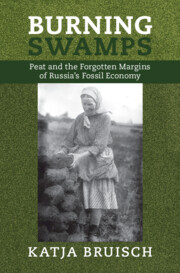Refine search
Actions for selected content:
671 results
11 - Lay Participation in Legal Decision-Making in Asia in a Global Context
- from Part III - Law’s Movements
-
-
- Book:
- Inter-Asian Law
- Print publication:
- 22 January 2026, pp 214-226
-
- Chapter
-
- You have access
- Open access
- HTML
- Export citation
13 - A Unicorn under Sanctions: The Case of Yandex
-
-
- Book:
- Unicorns from Emerging Economies
- Published online:
- 05 December 2025
- Print publication:
- 08 January 2026, pp 357-375
-
- Chapter
- Export citation
Conditions of subversive reach comparing societal and strategic factors for Russian propaganda outlets’ reach among Western European fringe communities
-
- Journal:
- European Journal of International Security , First View
- Published online by Cambridge University Press:
- 12 December 2025, pp. 1-23
-
- Article
-
- You have access
- Open access
- HTML
- Export citation
1 - Imperial Nationalism
- from Part I - Imperialism and Nationalism
-
- Book:
- Russia's War on Ukraine
- Published online:
- 20 November 2025
- Print publication:
- 04 December 2025, pp 21-56
-
- Chapter
- Export citation
Conclusion
-
- Book:
- Socialist De-Colony
- Published online:
- 10 November 2025
- Print publication:
- 20 November 2025, pp 266-288
-
- Chapter
-
- You have access
- Open access
- HTML
- Export citation
Turning a Blind Eye to Repression: Examining Popular Approval for State Crackdowns on Peaceful Protests in Russia
-
- Journal:
- British Journal of Political Science / Volume 55 / 2025
- Published online by Cambridge University Press:
- 10 November 2025, e156
-
- Article
-
- You have access
- Open access
- HTML
- Export citation
6 - Trumpism and the Future of Impunity
-
- Book:
- Killing Machines
- Published online:
- 23 October 2025
- Print publication:
- 06 November 2025, pp 200-259
-
- Chapter
-
- You have access
- Open access
- HTML
- Export citation

Distant Friends and Intimate Enemies
- A History of American-Russian Relations
-
- Published online:
- 30 October 2025
- Print publication:
- 20 November 2025
Economic knock-on effects of Russia’s geopolitical risk on advanced economies: a Bayesian global VAR approach
-
- Journal:
- Macroeconomic Dynamics / Volume 29 / 2025
- Published online by Cambridge University Press:
- 29 October 2025, e153
-
- Article
-
- You have access
- Open access
- HTML
- Export citation
Chapter 11 - Bloomsbury and Russomania
- from Part II - Global Bloomsbury
-
-
- Book:
- A History of the Bloomsbury Group
- Published online:
- 09 October 2025
- Print publication:
- 23 October 2025, pp 171-186
-
- Chapter
- Export citation
Reacting to a geopolitical setback: NATO expansion in Sweden and Finland through the lens of Russian geopolitical culture
-
- Journal:
- European Journal of International Security , First View
- Published online by Cambridge University Press:
- 20 October 2025, pp. 1-21
-
- Article
-
- You have access
- Open access
- HTML
- Export citation
Chapter 27 - Rus’
- from Poland-Lithuania, Rus’, and Byzantium
-
-
- Book:
- The Cambridge Guide to Global Medieval Travel Writing
- Published online:
- 03 October 2025
- Print publication:
- 02 October 2025, pp 480-499
-
- Chapter
- Export citation
Introduction
-
- Book:
- Burning Swamps
- Published online:
- 06 September 2025
- Print publication:
- 25 September 2025, pp 1-24
-
- Chapter
-
- You have access
- HTML
- Export citation
Beneath the Oprichnik’s Brocade: Investigating Tchaikovsky’s Queerest Opera
-
- Journal:
- Cambridge Opera Journal , First View
- Published online by Cambridge University Press:
- 24 September 2025, pp. 1-21
-
- Article
-
- You have access
- Open access
- HTML
- Export citation
Cultural Autonomy, Zeitgeist and Simulation Politics: Russia as a Specimen
-
- Journal:
- Nationalities Papers / Volume 53 / Issue 6 / November 2025
- Published online by Cambridge University Press:
- 22 September 2025, pp. 1396-1414
-
- Article
-
- You have access
- Open access
- HTML
- Export citation
Human Rights Protection in Europe and Russia: Addressing the Implications of Russian Expulsion Under the Statute of the Council of Europe and the European Convention on Human Rights
-
- Journal:
- International Journal of Legal Information / Volume 53 / Issue 3 / Winter 2025
- Published online by Cambridge University Press:
- 16 September 2025, pp. 187-198
- Print publication:
- Winter 2025
-
- Article
- Export citation
In Transit, Towards Transformation? Penal Change in Russia in a Contested Political Landscape
-
- Journal:
- Law & Social Inquiry , First View
- Published online by Cambridge University Press:
- 15 September 2025, pp. 1-20
-
- Article
-
- You have access
- Open access
- HTML
- Export citation

Burning Swamps
- Peat and the Forgotten Margins of Russia's Fossil Economy
-
- Published online:
- 06 September 2025
- Print publication:
- 25 September 2025
Antarctica and US policy: a strategic evolution amid global shifts
-
- Journal:
- Antarctic Science / Volume 37 / Issue 5 / October 2025
- Published online by Cambridge University Press:
- 03 September 2025, pp. 501-510
-
- Article
-
- You have access
- Open access
- HTML
- Export citation
The Value of Values for Autocrats: Traditional Morality and Putin’s 2020 Term-Limit Contravention
-
- Journal:
- Perspectives on Politics , First View
- Published online by Cambridge University Press:
- 25 August 2025, pp. 1-16
-
- Article
-
- You have access
- Open access
- HTML
- Export citation
